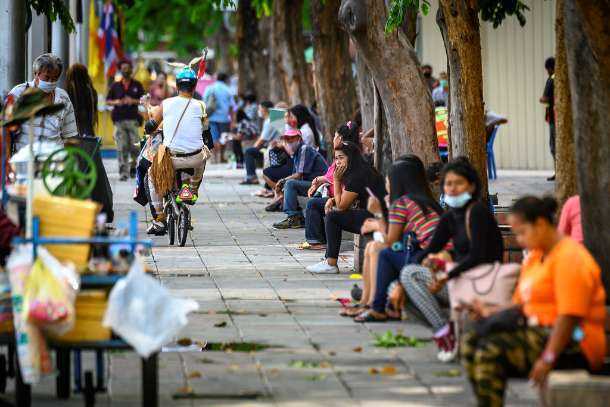
Unemployed people sit on the side of a major street in Bangkok on Sept. 15. Measures to contain the pandemic have come at a great cost to the economy and to the livelihoods of millions. (Photo: AFP)
If you are a poor Laotian, Cambodian or Burmese and want to work in Thailand to make ends meet for want of work back home, well, tough luck.
This is the message that Thai authorities are sending migrant workers by carrying on with a stepped-up crackdown on people who enter illegally from neighboring countries as Thailand seeks to limit the spread of Covid-19.
In one of the latest cases, 14 Laotian migrants, who comprised seven women and seven men and were travelling in a van at night on Sept. 13, were arrested in the northeastern province of Ubon Ratchathani, which borders Laos, after their car was stopped for a search by police at 1am.
The Laotian migrant workers were on their way to Bangkok, according to police, and had crossed into Thailand by boat on the Mekong River, which separates the two countries.
The migrants reportedly told police they had paid 4,000 baht (US$130) each to brokers who promised to take them to new jobs in Thailand.
The day before, border patrol officers detained 12 Cambodians after they had sneaked into Thailand by navigating a waterway on the border and scaling a fence in an eastern province. Thailand’s borders have remained closed for most people from neighboring countries for the past six months.
The Cambodian men reportedly told the authorities that they could not find a job back home in the Cambodian town of Poipet and had run out of money, so they were hoping to try their luck in Thailand by sneaking into the country.
“Thousands of Cambodians had been hoping the border would soon be reopened so that they could resume working [in Thailand],” the Bangkok Post reported.
Scores of migrant workers from Laos, Cambodia and Myanmar have been detained in recent days for entering Thailand illegally with the aim of resuming work after a prolonged lockdown earlier this year deprived millions of low-income earners, including migrant workers, of their livelihoods.
Work conditions in Thailand, which boasts one of Southeast Asia’s largest economies as a middle-income country, can be grueling for menial laborers. Yet millions of disadvantaged people from neighboring nations continue to seek work in the country as comparable employment opportunities are unavailable back home.
Before the pandemic, up to five million migrant workers were employed in Thailand, many of them in irregular and undocumented lines of low-paid menial work, according to the United Nations’ International Organization for Migration (IOM).
“Of the 4-5 million migrants that are estimated to be living and working in Thailand, about 1-2.5 million are thought to hold irregular status,” the IOM notes, adding that sectors such as fishing, agriculture, hospitality, domestic work and manufacturing all rely largely on migrant workers for manpower.
“High costs, long waiting times and bureaucratic red tape discourage many from entering to work in Thailand through legal routes,” the UN agency explains. “The lack of effective law enforcement has also contributed to several pressing issues such as poor working conditions, exploitation, human smuggling and trafficking, and transnational crime.”
Thailand serves a key economic function in the region by providing employment for millions of people in Laos, Myanmar and Cambodia, who comprise the bulk of the migrant workforce and are drawn by job opportunities and higher wages.
However, Thailand continues to impose severe restrictions on the movement of migrant workers from these neighboring countries for fear that they might spread Covid-19. Thailand has had no documented cases of local transmissions of the potentially deadly coronavirus that causes Covid-19 for more than three months.
Yet measures to contain the pandemic have come at a great cost to the economy and to the livelihoods of millions. Key sectors in Thailand, such as tourism, services and manufacturing, have especially been hit hard and experts predict that the economy could shrink by as much as 10 percent this year over last year.
“The pandemic is scarring the economy, especially with the [high rates of] business closures and unemployment,” says Yunyong Thaicharoen, executive vice-president of the Economic Intelligence Centre, a research think tank of Siam Commercial Bank. “With a vulnerable labor market, underemployed and furloughed workers could reach 3-5 million in the coming period.”
The pandemic has been ruinous for millions of low-income earners, whether they are Thai nationals or migrant laborers, and has led to widespread misery and desperation.
The rate of suicides among Thais, partly driven by increasing concerns about economic woes, has spiked in recent months, with a fifth more suicide deaths recorded in the first six months of this year than during the same period last year, according to the Ministry of Health. No statistics are available on the current suicide rate among migrant workers, but it is believed to be similarly high.
Health experts have been warning that continued economic hardships can take a heavy toll on the mental and physical well-being of people, especially the poor. Chronic financial woes can worsen the already fragile state of mind of people suffering from emotional and mental problems, they say.
“If someone already has severe economic problems, then Covid-19 makes the situation more severe and puts them under more stress,” said Amornthep Sachamuneewongse, a prominent mental health advocate.


